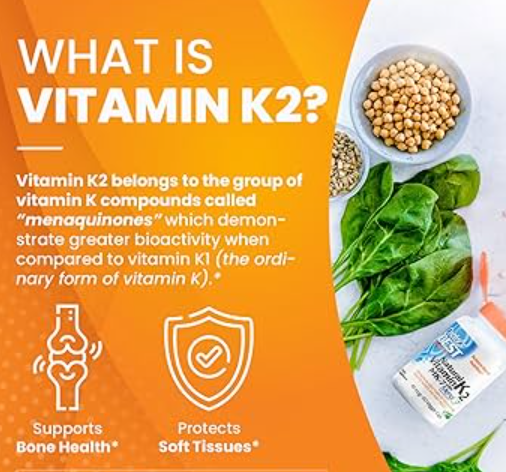BOURSESSENEGAL – Are you aware of the vitamin K2 benefits? While many people focus on vitamins like C and D, vitamin K2 often flies under the radar. However, this essential nutrient plays a crucial role in maintaining your overall health. In this detailed guide, we will explore the various benefits of vitamin K2, its sources, how it works in the body, and tips for ensuring you get enough of it.
What is Vitamin K2?
Understanding Vitamin K2
Vitamin K2, also known as menaquinone, is part of the vitamin K family. It exists in several forms, the most common being MK-4 and MK-7. This vitamin is vital for various bodily functions, particularly in promoting bone and cardiovascular health. While vitamin K1 primarily comes from leafy greens, K2 is often found in fermented foods and animal products.
The Role of Vitamin K2 in the Body
Vitamin K2 works by activating proteins that regulate calcium in your body. This regulation ensures that calcium goes to the right places—like your bones—while preventing it from accumulating in arteries and soft tissues. This action is essential for overall health and longevity.
Key Vitamin K2 Benefits
1. Promotes Bone Health
One of the most significant vitamin K2 benefits is its role in maintaining strong bones. Research shows that K2 helps activate osteocalcin, a protein that binds calcium to your bones. Higher levels of osteocalcin lead to better bone mineralization, reducing the risk of fractures.
Studies on Bone Density
Several studies have demonstrated that individuals with higher vitamin K2 intake have greater bone density. For example, postmenopausal women, who are at increased risk of osteoporosis, can particularly benefit from adequate K2 levels.
2. Supports Cardiovascular Health
Vitamin K2 also plays a vital role in heart health. It helps regulate calcium levels in the arteries, preventing calcification. When arteries calcify, it can lead to increased blood pressure and a higher risk of heart disease.
The Connection Between K2 and Heart Disease
Research suggests that higher vitamin K2 intake correlates with a lower risk of coronary heart disease. A notable study found that individuals who consumed more K2 had a significantly lower risk of arterial calcification.
3. Enhances Dental Health
Interestingly, vitamin K2 contributes to oral health as well. It helps activate proteins that support the health of your teeth and jawbone. This benefit can lead to stronger teeth and a lower risk of cavities.
K2 and Gum Health
Research indicates that vitamin K2 may help reduce inflammation in the gums, contributing to better overall oral health. Incorporating K2-rich foods may help you maintain a healthy smile.
4. May Improve Insulin Sensitivity
Emerging research suggests that vitamin K2 might enhance insulin sensitivity, making it beneficial for those with insulin resistance or type 2 diabetes. This effect can help manage blood sugar levels more effectively.
K2 and Metabolic Health
Some studies have shown that individuals with higher vitamin K2 levels tend to have better metabolic profiles. This relationship highlights K2’s potential role in supporting healthy blood sugar management.
5. Supports Brain Health
Vitamin K2 may also have neuroprotective properties. Some studies suggest that K2 can support brain health and may even help in reducing the risk of neurodegenerative diseases.
The Mechanism Behind K2’s Effect on Brain Health
Vitamin K2’s ability to help protect nerve cells from oxidative stress contributes to its potential benefits for cognitive function. This aspect makes it an important nutrient for aging individuals.
Sources of Vitamin K2
Dietary Sources of K2
To enjoy the benefits of vitamin K2, you need to include it in your diet. Here are some excellent sources:
- Fermented Foods: Natto (a fermented soy product) is one of the richest sources of MK-7, the most bioavailable form of K2.
- Dairy Products: Cheese, especially hard cheeses, contains significant amounts of K2.
- Eggs: Eggs, particularly the yolks, are good sources.
- Meat: Chicken, beef, and liver provide K2 in varying amounts.
Supplements
If you struggle to get enough K2 from your diet, consider supplements. K2 supplements are available in both MK-4 and MK-7 forms. Always consult a healthcare professional before starting any supplement regimen.
How Much Vitamin K2 Do You Need?
Recommended Intake
There is no established Recommended Dietary Allowance (RDA) for vitamin K2 specifically. However, some health experts suggest an intake of around 90-120 micrograms per day for adults to reap its benefits. Keep in mind that individual needs may vary based on health conditions, dietary habits, and lifestyle.
Potential Side Effects and Considerations
Is Vitamin K2 Safe?
For most people, vitamin K2 is safe and well-tolerated, especially when consumed through food. However, high doses from supplements may interfere with blood-thinning medications like warfarin. If you are on such medications, consult your healthcare provider before increasing your K2 intake.
Allergies and Sensitivities
Though rare, some individuals may experience allergic reactions to supplements. Always monitor how your body responds when introducing a new supplement into your routine.
Conclusion: Embrace the Benefits of Vitamin K2
In summary, the vitamin K2 benefits are extensive and impactful. From promoting bone and heart health to enhancing dental and brain function, K2 is a vital nutrient worth considering. By including K2-rich foods in your diet or using supplements if necessary, you can significantly improve your overall health.
As you explore ways to incorporate more vitamin K2 into your life, remember that a balanced diet filled with whole foods is the best approach. Stay informed, consult with healthcare professionals when needed, and take proactive steps to ensure your health is a top priority. Embrace the power of vitamin K2 and enjoy its many benefits!
REFERENCE : https://www.health.com/



